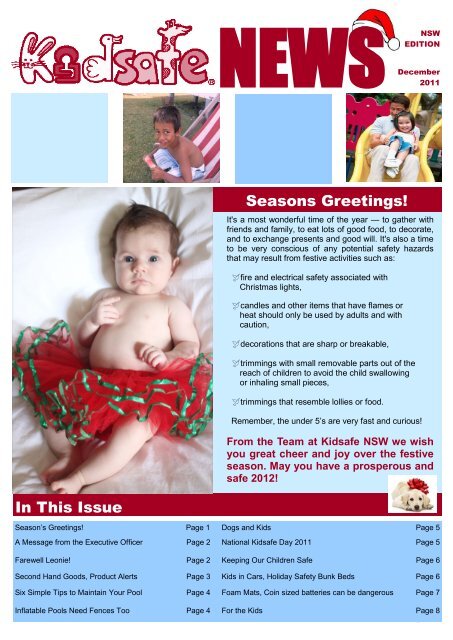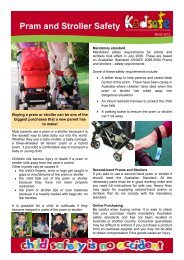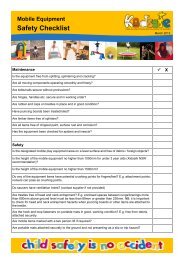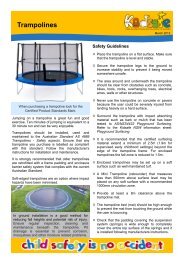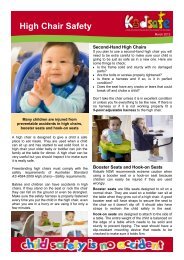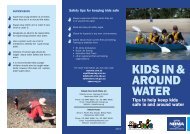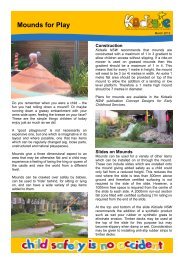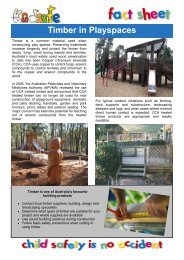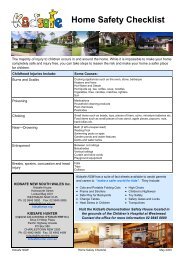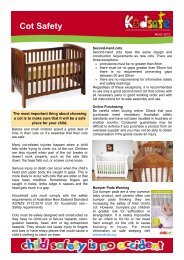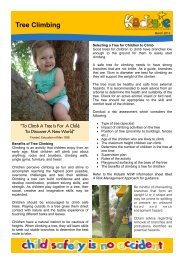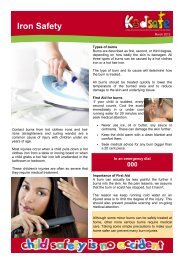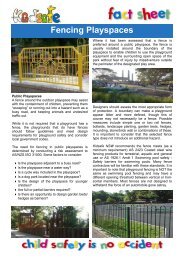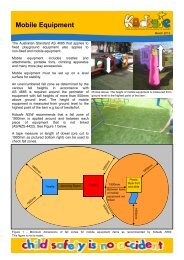NEWS - Kidsafe NSW
NEWS - Kidsafe NSW
NEWS - Kidsafe NSW
Create successful ePaper yourself
Turn your PDF publications into a flip-book with our unique Google optimized e-Paper software.
<strong>NEWS</strong><br />
<strong>NSW</strong><br />
EDITION<br />
December<br />
2011<br />
Seasons Greetings!<br />
It's a most wonderful time of the year — to gather with<br />
friends and family, to eat lots of good food, to decorate,<br />
and to exchange presents and good will. It's also a time<br />
to be very conscious of any potential safety hazards<br />
that may result from festive activities such as:<br />
fire and electrical safety associated with<br />
Christmas lights,<br />
candles and other items that have flames or<br />
heat should only be used by adults and with<br />
caution,<br />
decorations that are sharp or breakable,<br />
trimmings with small removable parts out of the<br />
reach of children to avoid the child swallowing<br />
or inhaling small pieces,<br />
trimmings that resemble lollies or food.<br />
Remember, the under 5‘s are very fast and curious!<br />
From the Team at <strong>Kidsafe</strong> <strong>NSW</strong> we wish<br />
you great cheer and joy over the festive<br />
season. May you have a prosperous and<br />
safe 2012!<br />
In This Issue<br />
Season‘s Greetings! Page 1 Dogs and Kids<br />
Page 5<br />
A Message from the Executive Officer Page 2 National <strong>Kidsafe</strong> Day 2011<br />
Page 5<br />
Farewell Leonie! Page 2 Keeping Our Children Safe<br />
Page 6<br />
Second Hand Goods, Product Alerts Page 3 Kids in Cars, Holiday Safety Bunk Beds<br />
Page 6<br />
Six Simple Tips to Maintain Your Pool Page 4 Foam Mats, Coin sized batteries can be dangerous Page 7<br />
Inflatable Pools Need Fences Too Page 4 For the Kids<br />
Page 8<br />
Page 1
<strong>Kidsafe</strong> Campaigner<br />
Farewell to a great <strong>Kidsafe</strong> Campaigner -<br />
Leonie Forsyth<br />
The time has come to farewell Leonie Forsyth who has<br />
been associated with <strong>Kidsafe</strong> for almost 20 years, in<br />
her own words ‗it has been a labor of love‘ to advocate<br />
for child safety in the Hunter region.<br />
She has worked tirelessly ‗on behalf of the children of<br />
our community, standing up for those who have no<br />
voice of their own.‘ Leonie believes that it has been an<br />
honor and a privilege to help parents, carers and<br />
grandparents make a better environment for their<br />
children.<br />
Leonie leaves <strong>Kidsafe</strong> Hunter strong and in a position<br />
to continue to grow and embrace the future - her<br />
passion for injury prevention is contagious!<br />
On behalf of the staff, volunteers,<br />
t h e H u n t e r R e g i o n a l<br />
Sub-Committee and Council<br />
Members of <strong>Kidsafe</strong> <strong>NSW</strong> sincere<br />
thanks to Leonie, (ably supported<br />
by her husband Walter) for establishing<br />
such a high profile in the<br />
Hunter and for contributing nationally<br />
to <strong>Kidsafe</strong>‘s mission to ‗make a<br />
safer world for kids.‘<br />
<strong>Kidsafe</strong> <strong>NSW</strong><br />
<strong>Kidsafe</strong> House, Hainsworth Street<br />
WESTMEAD <strong>NSW</strong> 2145<br />
Postal Address<br />
c/o The Children‘s Hospital at Westmead<br />
Locked Bag 4001<br />
Westmead <strong>NSW</strong> 2145<br />
Phone: 02 9845 0890 Fax: 02 9845 0895<br />
Email: kidsafe@health.nsw.gov.au<br />
Website: kidsafensw.org<br />
<strong>Kidsafe</strong> Hunter<br />
Shop 5, Pacific Hwy Arcade, Hilltop Plaza<br />
Charlestown <strong>NSW</strong> 2290<br />
PH: 0249424488 Fax: 02 4942 4499<br />
Email: kidsafe@kidsafehunter.com<br />
Website: kidsafehunter.com<br />
A Message from the<br />
Executive Officer<br />
Dear Readers,<br />
You‘ll notice a distinct ‗summer‘ flavour<br />
about this Newsletter! Families are<br />
gearing up for ‗fun in the sun‘ and planning holiday<br />
breaks over the festive season.<br />
At <strong>Kidsafe</strong> we are beginning to receive requests for<br />
safety information about holidaying with children, water<br />
safety, recreation and creative play options for children<br />
of all ages. Therefore we have endeavoured to address<br />
some of the issues in this edition. If there is something<br />
that you would like information about or you would like<br />
one of our safety officers to follow up for you, please<br />
don‘t hesitate to email us at kidsafe@health.nsw.gov.au<br />
I would also like to take this opportunity to thank the<br />
wonderful staff at <strong>Kidsafe</strong> <strong>NSW</strong> located at the<br />
Westmead and Charlestown offices and to<br />
acknowledge the great support provided by the <strong>NSW</strong><br />
Council and the Hunter Regional Sub-Committee. The<br />
work of <strong>Kidsafe</strong> is directed by a team of highly qualified<br />
paediatric clinicians, researchers, educators and<br />
industry experts and I would like to acknowledge their<br />
support and commitment which they offer in addition to<br />
their very valuable work of providing ‗a safer world for<br />
kids.‘<br />
Lastly, the extension to the <strong>Kidsafe</strong> Safety<br />
Demonstration House at Westmead has been<br />
completed! Thanks must go to our Project Manager Kay<br />
Lockhart for her diligence and leadership and to the<br />
<strong>NSW</strong> Government‘s Community Building Partnership<br />
Program for the funds. See<br />
panel overleaf for list of our<br />
major sponsors and<br />
supporters.<br />
On behalf of <strong>Kidsafe</strong> <strong>NSW</strong>,<br />
Season’s Greetings<br />
Christine Erskine<br />
SUPPORT KIDSAFE <strong>NSW</strong><br />
You can support <strong>Kidsafe</strong> <strong>NSW</strong> in a number of ways.<br />
Your contribution will assist us to continue many of our<br />
community education and research programs and to<br />
begin new initiatives.<br />
For more information contact the <strong>Kidsafe</strong> <strong>NSW</strong> office on<br />
02 98450890.<br />
Page 2
Second Hand Goods<br />
The arrival of a baby can be a big expense and many<br />
parents may purchase items such as cots, change<br />
tables, prams and car seats second hand as a way of<br />
reducing costs.<br />
Before buying second hand goods it is recommended<br />
to check that the item meets current safety standards.<br />
Most new products are required to meet safety<br />
standards and are clearly labelled.<br />
Standards are being continually updated so products<br />
which may have been purchased and thought safe a<br />
couple of years ago may now be considered a danger<br />
or hazardous to children.<br />
Furthermore, when buying second hand goods there<br />
are often no instructions on how to use and maintain<br />
the product and no warranties which mean if there is a<br />
fault the manufacturer will not fix it.<br />
With a second hand product you may not be aware of<br />
its history this is particularly important with car<br />
restraints that may have been involved in a car<br />
accident and may be damaged and be very unsafe.<br />
Products such as cots and prams must meet mandatory<br />
safety standards. It is important to ensure that your child<br />
is provided with the safest products available.<br />
Most old cot designs are now considered unsafe and do<br />
not meet safety standards.<br />
New prams have also been designed to ensure your<br />
child‘s fingers, arms, legs, head and body won‘t be<br />
trapped. They also have additional features such as five<br />
point harnesses and head barriers so your child cannot<br />
fall out.<br />
So if you are considering buying second hand double<br />
check what you are actually buying!<br />
For more information visit: productsafety.gov.au<br />
Product Alerts<br />
Bean Bag Safety<br />
Only buy bean bags and bean<br />
bag fillings that meet the<br />
Australian Standard<br />
Keep beans, bag covers and bean bag refills out<br />
of reach if children<br />
Never leave children alone when playing with a<br />
bean bag<br />
Check bean bags for sturdy seams that stop<br />
beads from leaking out<br />
Extension to <strong>Kidsafe</strong> House 2011<br />
<strong>Kidsafe</strong> <strong>NSW</strong> was able extend the Demonstration Safety<br />
House to include a meeting/training room. Thanks to the<br />
generous support from the following organisations and<br />
businesses:<br />
Keeping baby safe - now available as an eBook<br />
The Keeping baby safe booklet<br />
provides some easy steps to<br />
ensure your baby remains safe in<br />
your home. It lists common<br />
dangers and how you can identify<br />
and remove potential hazards. The<br />
booklet shows you what to look for<br />
when purchasing infant and<br />
nursery products, as well as tips<br />
on how to use these products<br />
safely.<br />
The guide is aimed at expectant parents, and parents<br />
and carers of children under five years old.<br />
The Keeping baby safe booklet is available<br />
electronically and in print at productsafety.gov.au<br />
Page 3
Six Simple Tips to Maintain Your Pool<br />
As a pool owner you are<br />
responsible for ensuring the<br />
safety of children in your<br />
home and neighbourhood.<br />
Summer is the time when<br />
more people are enjoying their<br />
swimming pools and tragically<br />
this is when more drowning<br />
incidents occur.<br />
One of the main reasons for children drowning in pools<br />
is because of faulty pool fencing. Protect children by<br />
checking the swimming pool fence for faults,<br />
particularly in the months leading up to summer.<br />
The Children‘s Hospital at Westmead recommends you<br />
use the following tips to maintain your pool fence:<br />
Regularly check that the gate self-closes and<br />
self-latches<br />
Regularly check and adjust the latching device as<br />
needed to ensure that they are operating<br />
correctly and have not been affected by the<br />
ground, fence or latch movement.<br />
Regularly check fencing panels for correct gaps,<br />
rust , wear and tear<br />
Regularly check all fence<br />
bolts, screws and fasteners<br />
to make sure they are tight<br />
and in good order. Any<br />
loose bolts, screws and<br />
fasteners should be<br />
tightened or replaced.<br />
Regularly replace springs<br />
and regularly spray self-closing gate hinges, locks<br />
and latches with lubricating oil or silicone to help<br />
prevent many of the faults relating to self-closing<br />
and self-latching gates<br />
Make sure trees, shrubs, BBQ‘s, pot plants, toys,<br />
ladders, chairs and other objects are not within the<br />
90cm non-climbable zone on the fence and are<br />
stored as far away from the fence as possible<br />
For further information about pool fencing, the common<br />
faults and how to check its safety, view the Protect<br />
Your Pool, Protect Your Kids online video or<br />
download the inspection checklist at:<br />
www.kidshealth.chw.edu.au/projects/drowning -<br />
prevention/swimming-pool-fencing<br />
Inflatable Pools Need Fences Too!<br />
Inflatable swimming pools are popular due to their easy set-up and low<br />
cost. There are significant dangers that all pool owners should be aware<br />
of.<br />
Inflatable pools can be more risky than pools that have been built. This<br />
is because most of these pools do not have fences and some are not<br />
able to be emptied after use due to their size. Without fences, children<br />
have easy access to the water in the pool, placing them at increased<br />
risk of drowning.<br />
From 1 July 2009 to 30 June 2010, 33 children under five years of age<br />
drowned in Australia. For every drowning death in <strong>NSW</strong>, a further 4-5<br />
children were hospitalised as a result of near drowning in 2008-09.<br />
Children under five years of age are most at risk of drowning, compared<br />
to all other age groups, with about 50% of drowning deaths occurring in<br />
swimming pools.*<br />
Currently, no Australian data on drowning in inflatable pools exists,<br />
however in America, rates of drowning in inflatable and portable pools<br />
has increased over the years from nine cases in 2004 to 17 cases in<br />
2005 and 21 cases in 2006.<br />
By law, all inflatable or portable swimming pools that are capable of<br />
being filled to 300mm of water or more require a four-sided fence.<br />
Fencing improves the safety of your children and reduce the risk of<br />
drowning.<br />
*For references and more information on safe pool fencing visit<br />
www.kidshealth.chw.edu.au/projects/drowning-prevention/swimming-pool-fencing<br />
Page 4
Dogs and Kids<br />
Safety tips include:<br />
Animals, particularly dogs can provide wonderful<br />
experiences for children and are part of many people‘s<br />
lives. Children can come into contact with dogs as part<br />
of their family, at friend‘s or relative‘s places or in public<br />
places such as parks or recreation areas.<br />
Children under the age of five are most at risk of dog<br />
bite injuries and are most frequently bitten by their own<br />
family dog or by a friend‘s dog. In <strong>NSW</strong> from January to<br />
September 2011 there were 488 dog attacks on<br />
children reported to local councils.* Teaching children<br />
how to interact properly with dogs can reduce the risk<br />
of dog bites.<br />
Supervise children closely<br />
during play around dogs<br />
Separate when you are<br />
unable to supervise dogs<br />
and children<br />
Teach children to leave a<br />
dog alone when sleeping,<br />
eating or gnawing a bone<br />
Teach children and your<br />
dog to be gentle with each<br />
other and to interact safely<br />
The Royal Children‘s Hospital in Melbourne has<br />
produced the dogs ‘n’ kids Information Resource Kit<br />
which contains comprehensive information to reduce<br />
the incidence and severity of dog bites to children.<br />
For more information visit rch.org.au/safetycentre<br />
*From dog attack incidents reported by all<br />
councils to <strong>NSW</strong> Office of Local Government<br />
from January to September 2011<br />
National <strong>Kidsafe</strong> Day 2011<br />
National <strong>Kidsafe</strong> Day was held on Tuesday 25th October and was dedicated to<br />
reducing road related injuries to children in Australia in line with the World Health<br />
Organisation‘s ‗Decade of Action for Road Safety‘.<br />
<strong>Kidsafe</strong> presented the 2011 National <strong>Kidsafe</strong> Day Awards, supported by The<br />
Leycester Meares Bequest, to recognise road safety champions in each State/<br />
Territory in a number of categories.<br />
Vicki Milne from <strong>Kidsafe</strong> <strong>NSW</strong> presents<br />
the <strong>Kidsafe</strong> Business Award to Mel<br />
Ellis, Midson Road Child Care Centre.<br />
Llynda Nairn (left) receives the Local<br />
Champion Award presented by Tamara<br />
Blackmore (centre) and Leonie Forsyth<br />
(right) from <strong>Kidsafe</strong> <strong>NSW</strong> Hunter office.<br />
In <strong>NSW</strong>, the <strong>Kidsafe</strong> Business Award was awarded<br />
to the Midson Road Child Care Centre which has<br />
developed a comprehensive road safety education<br />
program involving children, parents, carers,<br />
grandparents and staff. As a community they are<br />
very proactive and believe that the safety<br />
messages trickle through to family and friends so<br />
that everyone is looking out for children!<br />
The Local Champion Award was awarded to<br />
Llynda Nairn who is based in the Hunter Region<br />
of <strong>NSW</strong>. As a seasoned performer, Llynda<br />
engages primary school students through juggling,<br />
comedy and play acting in order to promote safety<br />
on and around roads. She has a very novel and<br />
entertaining approach!<br />
We also acknowledge the great effort of Denistone<br />
East Primary School who held a mufti day in<br />
support of National <strong>Kidsafe</strong> Day with monies raised<br />
going to <strong>Kidsafe</strong> <strong>NSW</strong>.<br />
Page 5
Keeping Our Children Safe<br />
The <strong>NSW</strong> Government has launched an education<br />
campaign to protect children from avoidable death and<br />
injury.<br />
Each year 8000 children are admitted to hospital<br />
because of falls, 50 of which are from windows and<br />
balconies. The Government has announced a new<br />
campaign which will see 40,000 brochures and posters<br />
distributed across the state. This material includes<br />
simple tips to avoid injury and save lives:<br />
The Fair Trading Minister, Anthony Roberts has<br />
indicated that posters will be sent directly to all<br />
licensed property and strata managers in <strong>NSW</strong> so they<br />
can provide this important information to landlords,<br />
rental tenants, strata owners corporations and strata<br />
residents.<br />
For more information visit:<br />
health.nsw.gov.au/childsafety<br />
kidsafensw.org<br />
Do fix windows open at no more than 10cm or fit<br />
secure window guards<br />
Do keep furniture and other things children can<br />
climb on away from windows and balcony edges<br />
Do lock doors and windows when the balcony is<br />
not being used<br />
Always supervise your child closely<br />
Kids in Cars<br />
Holiday Safety Bunk Beds<br />
Recent media reports have<br />
highlighted the need for<br />
parents and carers to be<br />
aware of the dangers of<br />
leaving children unattended<br />
in cars.<br />
Each year the NRMA rescues on average 2,000<br />
unattended children from cars. Emergency services also<br />
rescue many children.<br />
The temperature inside a car can reach dangerously<br />
high levels in just a few minutes. As the temperature<br />
increases, the child can develop heat stress and start to<br />
dehydrate. Young children are more sensitive to heat<br />
than older children and adults. This can put them at<br />
greater risk as their body temperature can reach<br />
dangerous high levels much sooner.<br />
What should parents and carers do<br />
<br />
<br />
<br />
<br />
<br />
If you must leave the car, even to run a quick<br />
errand - take the children with you.<br />
Never use the car as a substitute ‗babysitter‘.<br />
Never leave children in a car without adult<br />
supervision for any length of time, not even a<br />
minute!<br />
Lock cars and secure keys when at home to<br />
prevent children playing inside the car.<br />
Make ‘look before you leave’ a routine whenever<br />
you get out of the car.<br />
For the Kids in Cars brochure contact <strong>Kidsafe</strong> <strong>NSW</strong> on<br />
02 9845 0890 or visit our website kidsafensw.org<br />
An Australian Standards handbook for bunk bed safety is<br />
now available to the holiday accommodation industry.<br />
It‘s important for businesses to be aware of the safety<br />
standards and what‘s required of them. The handbook is<br />
the latest step in the ongoing campaign to educate<br />
businesses and prevent injuries.<br />
For a copy of the handbook visit saiglobal.com<br />
Whether your children use bunk beds every day or just<br />
on holidays, there are some simple rules you can follow<br />
to help protect them:<br />
never allow children to play on or around bunk beds<br />
never allow a child under nine to use the top bunk<br />
do not use the top bunk if it has no rails – put the<br />
mattress on the floor. Don‘t modify bunks in any way.<br />
before making a holiday booking, check with the<br />
renting agency or letting agent whether bunk beds<br />
meet the latest standards<br />
check ladders are properly attached and provide safe<br />
access to and from the top bunk<br />
familiarise yourself with the mandatory safety<br />
standard – if you have an old bunk that does not meet<br />
the standards get rid of it and get a new one that<br />
does.<br />
Accommodation providers are<br />
asked to adopt the safety<br />
r e q u i r e m e n t s a n d r i s k<br />
management practices outlined in<br />
the handbook.<br />
Page 6
Foam Mats<br />
Testing of foam play mats finds no<br />
safety risk to children<br />
Recent testing of foam play mats and toys for the<br />
chemical formamide has found no evidence that these<br />
products present any risk to children.<br />
The ACCC and some state/territory consumer product<br />
safety agencies tested a total of 16 ethylene vinyl<br />
acetate (EVA) foam products.<br />
Half of the products tested released no measureable<br />
amount of formamide, and where formamide was<br />
measured, the amounts released were very small.<br />
Based on the actual testing, it was concluded that a<br />
child would need to mouth for 20 minutes, or ingest, at<br />
least 4.17 square metres of typical foam play mat<br />
every day over their entire life to approach a level of<br />
exposure to formamide which might raise health<br />
concerns.<br />
The potential exposure of children to formamide from<br />
these products was calculated and compared to the<br />
internationally recognised lowest-observable-adverseeffect-level<br />
cited in Environment/Health Canada‘s<br />
Screening Assessment for the Challenge: Formamide.<br />
While the most contact children<br />
have with these products is<br />
through their skin, the exposure<br />
estimate also considered a worst<br />
case scenario, where children<br />
might mouth or ingest the foam.<br />
Foam play mats and toys<br />
typically available in Australia do<br />
not expose children to unsafe<br />
amounts of formamide and these<br />
products are safe for their<br />
intended purpose.<br />
Source: Product Safety Australia—<br />
productsafety.gov.au<br />
Coin Sized Batteries Can Be Hazardous<br />
Electronic devices are a part of daily life. And they‘re<br />
getting smaller, slimmer and sleeker. But inside the<br />
battery compartment of mini remote controls, small<br />
calculators, watches, flameless candles, singing<br />
greeting cards and other electronics, may be a very<br />
powerful coin-sized button battery.<br />
When swallowed, these batteries can get stuck in the<br />
throat and cause severe burns. Acid can also leak<br />
which can cause tissue damage.<br />
Children under 4 years are at the greatest risk. Many<br />
coin-sized button batteries can appear ―invisible‖ to<br />
parents because devices come with the batteries already<br />
installed.<br />
If a coin-sized button battery is swallowed, you should<br />
take your child to the emergency department<br />
immediately and advise doctors and nurses that it might<br />
be a coin sized button battery.<br />
For more information visit: www.productsafety.gov.au/<br />
content/index.phtml/itemId/985278<br />
To keep your children safe:<br />
Make sure there are no loose batteries within a<br />
child‘s reach.<br />
Ensure the cover of any devices which have these<br />
batteries are secured and the child is unable to<br />
remove it.<br />
Look in your home for any items that may contain<br />
coin-sized button batteries.<br />
Place devices out of sight and out of reach of small<br />
children.<br />
Keep loose or spare batteries locked away.<br />
Don‘t throw<br />
lithium batteries in<br />
the bin. Keep<br />
them safely out of<br />
reach of children<br />
before disposing<br />
them via a safe<br />
environment<br />
disposal system.<br />
Page 7
For the Kids<br />
HOLIDAY TIME<br />
C P M X K F Y F B Z<br />
J H M I A I T R E J<br />
T Z R M C F E I A T<br />
L N I I O D F E C C<br />
M L G O S L A N H Y<br />
Y X D P V T S D U O<br />
S T H G I L M S G G<br />
N L O N U F U A V C<br />
D Q Y K U K R J S Q<br />
S A N T A U S N N M<br />
SANTA<br />
FUN<br />
FAMILY<br />
FRIENDS<br />
SAFETY<br />
FOOD<br />
LIGHTS<br />
CHRISTMAS<br />
BEACH<br />
Kidd Safe says…<br />
Find the words<br />
SPOT THE<br />
HAZARDS…<br />
...in the bath<br />
room<br />
<strong>Kidsafe</strong> <strong>NSW</strong> is supported by:<br />
Page 8


